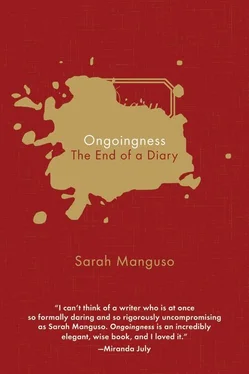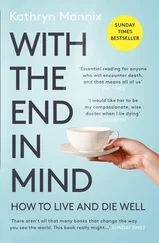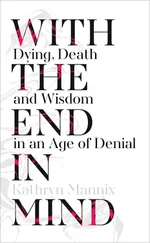In it I digest the time that passes, file it away so I no longer need to think about it, and if I spent all my time thinking about the past I’d stop moving into the future , I begin to write, but no — I’d keep moving. How ridiculous to believe myself powerful enough to stop time just by thinking.
There’s no reason to continue writing other than that I started writing at some point — and that, at some other point, I’ll stop. ♦
Often I believe I’m working toward a result, but always, once I reach the result, I realize all the pleasure was in planning and executing the path to that result.
It comforts me that endings are thus formally unappealing to me — that more than beginning or ending, I enjoy continuing. ♦
Before the baby was born, the diary allowed me to continue existing. It literally constituted me. If I didn’t write it, I wasn’t anything, but then the baby became a little boy who needed me more than I needed to write the diary. He needed me more than I needed to write about him.
The time I spent sitting and nursing and holding the baby and cleaning up his messes could have borne the worry from me as completely as I bore the baby, which in my experience marked a change of mind that by now seems permanent. ♦
Before I was a mother, I thought I was asking, How, then, can I survive forgetting so much?
Then I came to understand that the forgotten moments are the price of continued participation in life, a force indifferent to time. ♦
Now I consider the diary a compilation of moments I’ll forget, their record finished in language as well as I could finish it — which is to say imperfectly.
Someday I might read about some of the moments I’ve forgotten, moments I’ve allowed myself to forget, that my brain was designed to forget, that I’ll be glad to have forgotten and be glad to rediscover as writing. The experience is no longer experience. It is writing. I am still writing.
And I’m forgetting everything. My goal now is to forget it all so that I’m clean for death. Just the vaguest memory of love, of participation in the great unity. ♦
When I remember how this document began, I remember it as something I used to worry about. ♦
My son goes happily on.
One of his first words was bamboo. Everywhere we went, he called out to the bamboo that was or wasn’t there. Bamboo! He called his bear Bamboo and fell asleep whispering its name.
Time passed. He grew accustomed to the world. He learned more words.
His bright hair grew long.
Everything is new. His first lizard. His first funeral. Now we measure his age in years.
The future happens. It keeps happening.
The man is still alive, but the boy is gone. The light is out.
His light is out yet it shines triumphant from the next of the living, and when their time is up, their potential spent, the light will move along to the next brightest, and the next.
A flash — and I’m gone, but look, the churn of bodies through the world of light unending.
Look, here we are, even now—
I asked a few friends whether they thought I should excerpt the diary in this essay, praying they would say no.
None of them did.
But I didn’t want to read the thing, so I tried to reason my way out of the task. I envisioned a book without a single quote, a book about pure states of being. It sounded almost religious when I put it that way. I wasn’t sure what I meant, but I hoped it sounded convincing. A book about pure experience couldn’t quote sources. Its only source could be experience itself.
I was afraid that if I read the diary, I’d have to change what I’d written about it from memory. And producing even those few thousand words had been so arduous, I couldn’t bear the thought of having to rewrite them.
But I was even more afraid of facing the artifact of the person I was in 1992 and 1997 and 2003 and so on. Time punishes us by taking everything, but it also saves us — by taking everything. I’m still ashamed of things I said and did in front of one other person even if that person is dead.
I reread my favorite books to make sure they’re still perfect, but rereading them wears away at their perfection. I imagined how sick I might feel after reading the diary, the writing that stands in for my entire self.
It was while reading a letter from a childhood friend who continues to provide health care to people in underserved communities that I realized the jig was up. If I was never going to place malaria pills into the hands of the destitute, I needed to get my act together. I had to be sure I wasn’t keeping anything from the world that might help it along. If the point was to write things that prevent people from committing suicide, the least I could do would be to read my own diary. Just in case.
I realize how grandiose that sounds, but when your job is to think and write about yourself, the stakes start to appear artificially, comically high. And they must, for without them, I wouldn’t write at all. I’d spend the day reading the internet. I’d be about half-done by now.
As luck had it, a few weeks after making the big decision, I boarded a plane for a six-hour trip. I’d prepared for it by bringing nothing to read except my diary. The plane took off. Beverage service began. I drank half a cup of bitter coffee and opened the first of the twenty-three files.
As I read it I copied the passages I thought people might find interesting. There were some potent bits about social class. A few sexual oddments. By the time I got to 1995 I was on my way. What a year that had been.
After I’d skimmed about a hundred thousand words, I looked at what I’d collected, expecting a well-curated assortment of tidbits — something like ten pages of a David Markson novel.
It was not like that.
The collection was hopelessly arbitrary. I realized I’d have to read the diary many more times to ensure I was collecting the best excerpts, and many more times after that, once a form began to flicker in the collection’s murk, and I knew I didn’t have the time or the stomach for that. Just rereading my adolescent townie disapproval of the first twenty days of college was enough to make me want to tear out the chips or transistors or whatever it is in a computer that makes it remember things.
My troublingly arbitrary collection strategy was no less arbitrary than any arbitrarily systematic plan — for example, collecting the fourteenth day of every month or the first sentence of every thousand. The arbitrariness bothered me, not knowing whether I’d chosen the best bits, if indeed there were any that could be designated as such.
But the even greater problem was that no individual diary entry had been written to make sense by itself. It led neither away from the previous day nor toward the following day. It possessed no form separate from the greater form, which itself was almost formless — which itself was just accumulation, just day after day after day after day.
Imagine a biography that includes not just a narrative but also all the events that failed to foreshadow. Most of what the diary includes foreshadows nothing. Most of what it includes happens in the present and disappears. (Did I mention that I write the diary in present tense? I do.)
The threat of writing to an audience becomes only more present a danger as time passes and one’s audience increases , I once wrote and believed. And forgot. And read again, and now believe again.
The only thing I ever wrote that wasn’t for an audience was the diary.
Читать дальше












